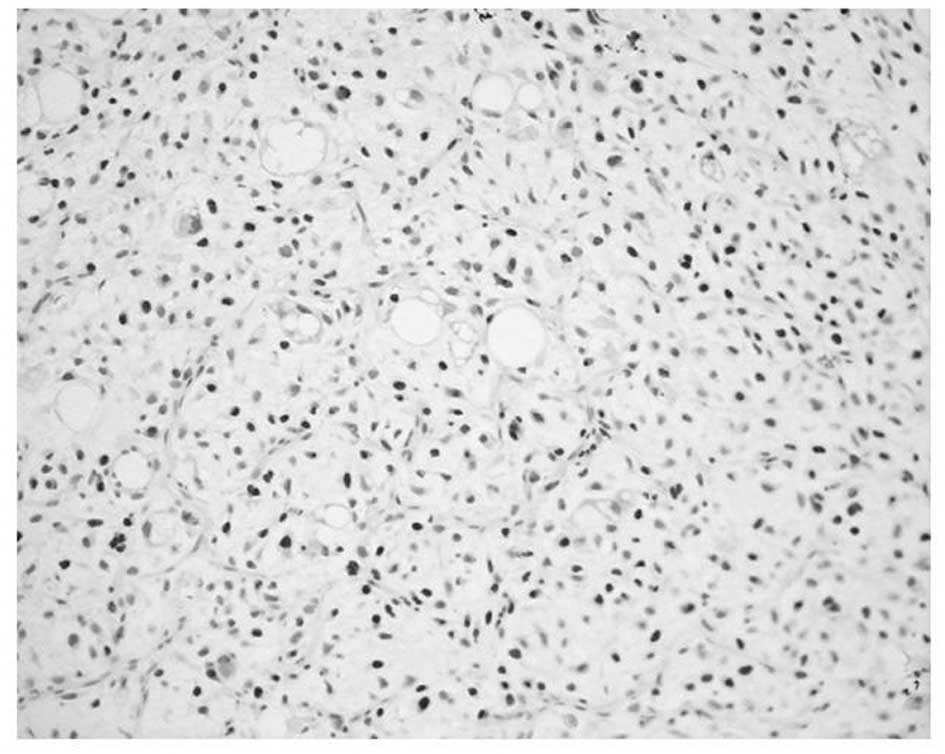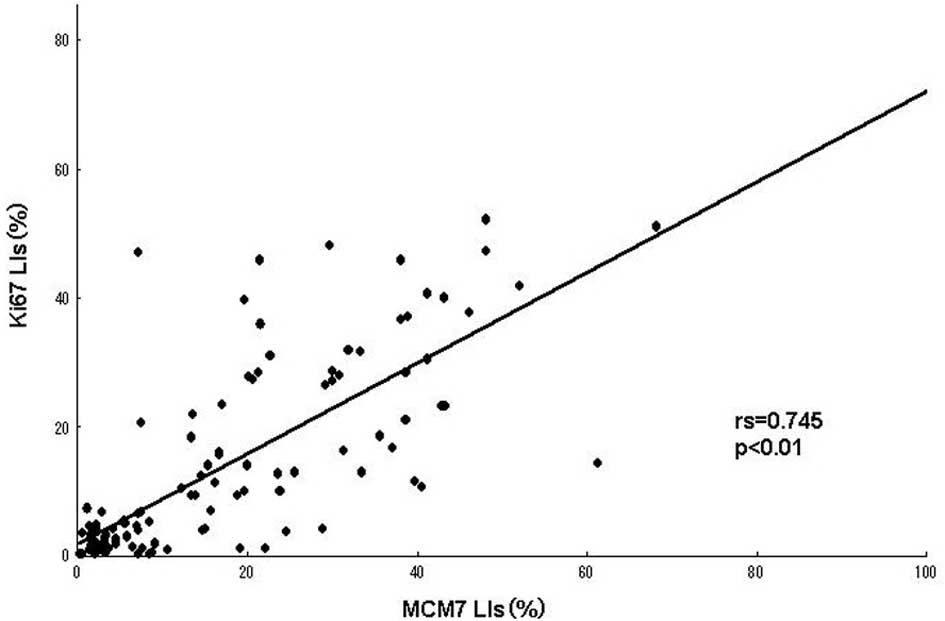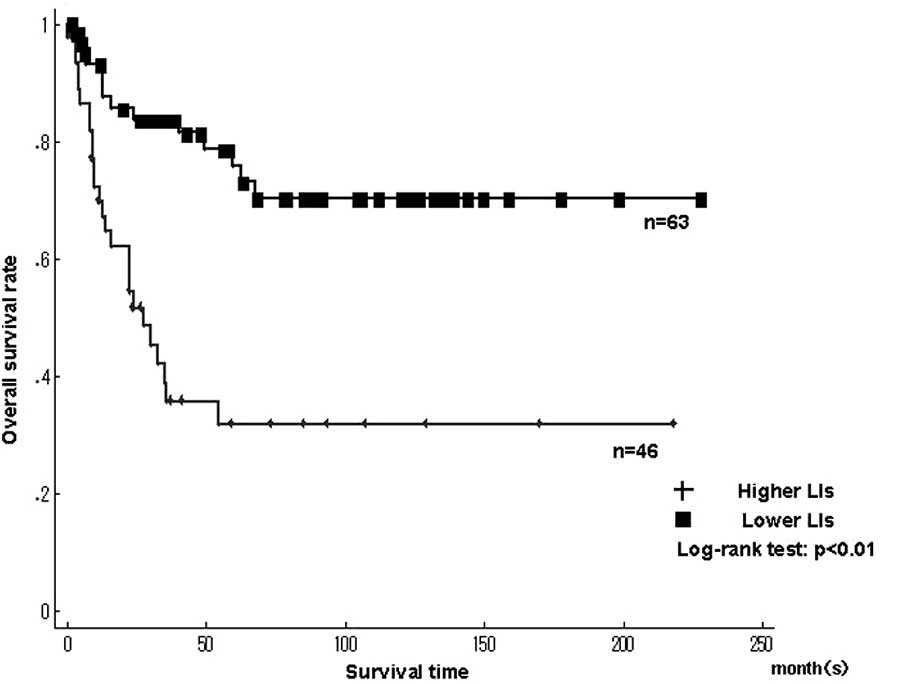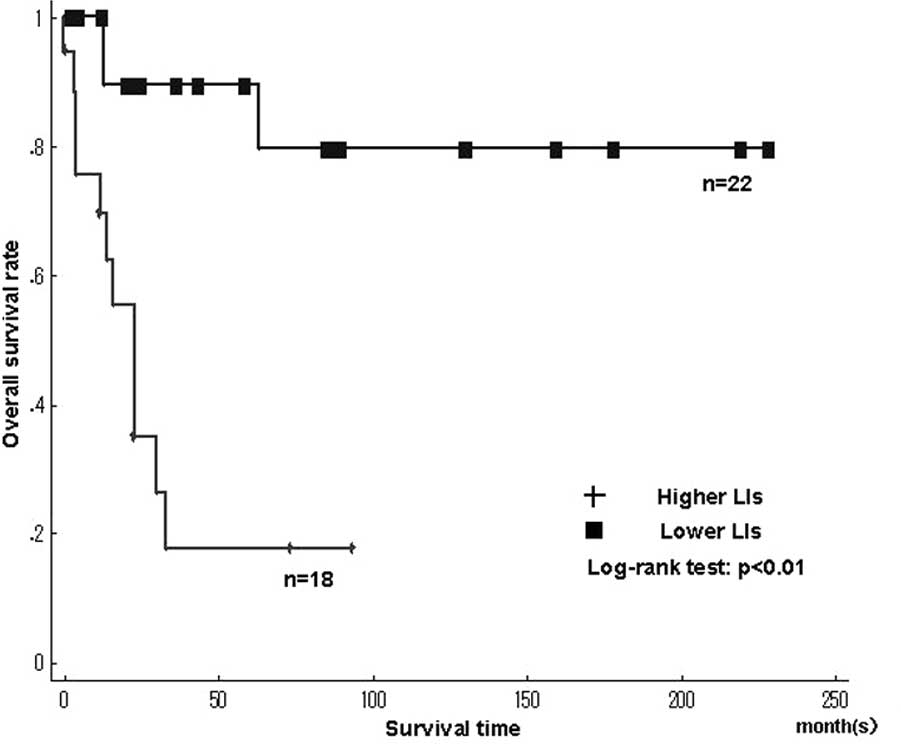|
1
|
Stefanovski PD, Bidoli E, De Paoli A, et
al: Prognostic factors in soft tissue sarcomas: a study of 395
patients. Eur J Surg Oncol. 28:153–164. 2002. View Article : Google Scholar : PubMed/NCBI
|
|
2
|
Tomita Y, Aozasa K, Myoui A, et al:
Histologic grading in soft-tissue sarcomas – an analysis of 194
cases including agnor count and mast-cell count. Int J Cancer.
54:194–199. 1993.
|
|
3
|
Levine EA: Prognostic factors in soft
tissue sarcoma. Semin Surg Oncol. 17:23–32. 1999. View Article : Google Scholar
|
|
4
|
Engellau J, Bendahl PO, Persson A, et al:
Improved prognostication in soft tissue sarcoma: independent
information from vascular invasion, necrosis, growth pattern, and
immunostaining using whole-tumor sections and tissue microarrays.
Hum Pathol. 36:994–1002. 2005. View Article : Google Scholar
|
|
5
|
Ahlen J, Wejde J, Brosjo O, et al:
Insulin-like growth factor type 1 receptor expression correlates to
good prognosis in highly malignant soft tissue sarcoma. Clin Cancer
Res. 11:206–216. 2005.PubMed/NCBI
|
|
6
|
Bramwell VHC, Tuck AB, Wilson SM, et al:
Expression of osteopontin and HGF/Met in adult soft tissue tumors.
Cancer Biology and Therapy. 4:1336–1341. 2005. View Article : Google Scholar : PubMed/NCBI
|
|
7
|
Huuhtanen RL, Blomqvist CP, Bohling TO, et
al: Expression of cyclin A in soft tissue sarcomas correlates with
tumor aggressiveness. Cancer Res. 59:2885–2890. 1999.PubMed/NCBI
|
|
8
|
Jensen V, Sorensen FB, Bentzen SM, et al:
Proliferative activity (MIB-1 index) is an independent prognostic
parameter in patients with high-grade soft tissue sarcomas of
subtypes other than malignant fibrous histiocytomas: a
retrospective immunohistological study including 216 soft tissue
sarcomas. Histopathology. 32:536–546. 1998. View Article : Google Scholar
|
|
9
|
Lopes JM, Nesland JM, Reis JS and Holm R:
Differential Ki67 and bcl-2 immunoexpression in solid-glandular and
spindle cell components of biphasic synovial sarcoma: a double
immunostaining assessment with cytokeratin and vimentin.
Histopathology. 40:464–471. 2002. View Article : Google Scholar
|
|
10
|
Oda Y, Tateishi N, Matono H, et al:
Chemokine receptor CXCR4 expression is correlated with VEGF
expression and poor survival in soft-tissue sarcoma. Int J Cancer.
124:1852–1859. 2009. View Article : Google Scholar : PubMed/NCBI
|
|
11
|
Ottaiano A, De Chiara A, Perrone F, et al:
Prognostic value of CD40 in adult soft tissue sarcomas. Clin Cancer
Res. 10:2824–2831. 2004. View Article : Google Scholar : PubMed/NCBI
|
|
12
|
Peiper M, Sato T, Zurakowski D, et al:
CD44s expression is associated with improved survival in soft
tissue sarcoma. Anticancer Res. 24:1053–1056. 2004.PubMed/NCBI
|
|
13
|
Sato O, Wada T, Kawai A, et al: Expression
of epidermal growth factor receptor, ERBB2 and KIT in adult soft
tissue sarcomas – a clinicopathologic study of 281 cases. Cancer.
103:1881–1890. 2005.
|
|
14
|
Tsiatis AC, Herceg ME, Keedy VL, et al:
Prognostic significance of c-Myc expression in soft tissue
leiomyosarcoma. Mod Pathol. 22:1432–1438. 2009. View Article : Google Scholar : PubMed/NCBI
|
|
15
|
Vesely K, Jurajda M, Nenutil R and Vesela
M: Expression of p53, cyclin D1 and EGFR correlates with
histological grade of adult soft tissue sarcomas: a study on tissue
microarrays. Neoplasma. 56:239–244. 2009. View Article : Google Scholar : PubMed/NCBI
|
|
16
|
Yamaga K, Osaki M, Kidani K, Shomori K,
Yoshida H and Ito H: High expression of enhancer of zeste homologue
2 indicates poor prognosis in patients with soft tissue sarcomas.
Mol Med Rep. 1:633–639. 2008.PubMed/NCBI
|
|
17
|
Yudoh K, Kanamori N, Ohmori K, Yasuda T,
Aoki M and Kimura T: Concentration of vascular endothelial growth
factor in the tumour tissue as a prognostic factor of soft tissue
sarcomas. Br J Cancer. 84:1610–1615. 2001. View Article : Google Scholar : PubMed/NCBI
|
|
18
|
Zhang B, Tomita Y, Ch’ng E, et al:
Prognostic significance of phosphorylated FOXO1 expression in soft
tissue sarcoma. Ann Surg Oncol. 16:1925–1937. 2009. View Article : Google Scholar : PubMed/NCBI
|
|
19
|
Osaki M, Yamashita H, Shomori K, Yoshida H
and Ito H: Expression of minichromosome maintenance-2 in human
malignant fibrous histiocytomas: Correlations with Ki-67 and P53
expression and apoptosis. Int J Mol Med. 10:161–168.
2002.PubMed/NCBI
|
|
20
|
Lindner K, Gregan J, Montgomery S and
Kearsey SE: Essential role of MCM proteins in premeiotic DNA
replication. Mol Biol Cell. 13:435–444. 2002. View Article : Google Scholar : PubMed/NCBI
|
|
21
|
Nishitani H and Lygerou Z: Control of DNA
replication licensing in a cell cycle. Genes to Cells. 7:523–534.
2002. View Article : Google Scholar : PubMed/NCBI
|
|
22
|
Ishimi Y: A DNA helicase activity is
associated with an MCM4, -6 and -7 protein complex. J Biol Chem.
272:24508–24513. 1997. View Article : Google Scholar : PubMed/NCBI
|
|
23
|
Forsburg SL: Eukaryotic MCM proteins:
beyond replication initiation. Microbiol Mol Biol Rev. 68:109–131.
2004. View Article : Google Scholar : PubMed/NCBI
|
|
24
|
McGarry TJ and Kirschner MW: Geminin, an
inhibitor of DNA replication, is degraded during mitosis. Cell.
93:1043–1053. 1998. View Article : Google Scholar : PubMed/NCBI
|
|
25
|
Lygerou Z and Nurse P: Cell cycle. License
withheld – Geminin blocks DNA replication. Science. 290:2271–2273.
2000.PubMed/NCBI
|
|
26
|
Wohlschlegel JA, Kutok JL, Weng AP and
Dutta A: Expression of geminin as a marker of cell proliferation in
normal tissues and malignancies. Am J Pathol. 161:267–273. 2002.
View Article : Google Scholar : PubMed/NCBI
|
|
27
|
Gonzalez MA, Pinder SE, Callagy G, et al:
Minichromosome maintenance protein 2 is a strong independent
prognostic marker in breast cancer. J Clin Oncol. 21:4306–4313.
2003. View Article : Google Scholar : PubMed/NCBI
|
|
28
|
Hashimoto K, Araki K, Osaki M, et al: MCM2
and Ki-67 expression in human lung adenocarcinoma: prognostic
implications. Pathobiology. 71:193–200. 2004. View Article : Google Scholar : PubMed/NCBI
|
|
29
|
Nariculam J, Loddo M, Masters J, Williams
G and Feneley M: MCM-2 expression in clinically localised prostate
cancer. Eur Urol Suppl. 7:7382008. View Article : Google Scholar
|
|
30
|
Padmanabhan V, Callas P, Philips G,
Trainer TD and Beatty BG: DNA replication regulation protein MCM7
as a marker of proliferation in prostate cancer. J Clin Pathol.
57:1057–1062. 2004. View Article : Google Scholar : PubMed/NCBI
|
|
31
|
Nishihara K, Shomori K, Fujioka S, et al:
Minichromosome maintenance protein 7 in colorectal cancer:
Implication of prognostic significance. Int J Oncol. 33:245–251.
2008.PubMed/NCBI
|
|
32
|
Shimizu M, Nikaido T, Kato K, et al:
Expression of replication-licensing factors MCM2 and MCM3 in normal
endometrium and endometrial carcinomas. In: 9th International
Menopause Society World Congress on the Menopause; pp. 159–162.
1999
|
|
33
|
Torres-Rendon A, Roy S, Craig GT and
Speight PM: Expression of MCM2, geminin and Ki67 in normal oral
mucosa, oral epithelial dysplasias and their corresponding
squamous-cell carcinomas. Br J Cancer. 100:1128–1134. 2009.
View Article : Google Scholar : PubMed/NCBI
|
|
34
|
Vargas PA, Cheng Y, Barrett AW, Craig GT
and Speight PM: Expression of Mcm-2, Ki-67 and geminin in benign
and malignant salivary gland tumours. J Oral Pathol Med.
37:309–318. 2008. View Article : Google Scholar : PubMed/NCBI
|
|
35
|
Salabat MR, Melstrom LG, Strouch MJ, et
al: Geminin is overexpressed in human pancreatic cancer and
downregulated by the bioflavanoid apigenin in pancreatic cancer
cell lines. Mol Carcinogen. 47:835–844. 2008. View Article : Google Scholar : PubMed/NCBI
|
|
36
|
Shrestha P, Saito T, Hama S, et al:
Geminin: a good prognostic factor in high-grade astrocytic brain
tumors. Cancer. 109:949–956. 2007. View Article : Google Scholar : PubMed/NCBI
|
|
37
|
Nishihara K, Shomori K, Tamura T, Fujioka
S, Ogawa T and Ito H: Immunohistochemical expression of geminin in
colorectal cancer: Implication of prognostic significance. Oncol
Rep. 21:1189–1195. 2009.PubMed/NCBI
|
|
38
|
Gonzalez MA, Tachibana KK, Chin SF, et al:
Geminin predicts adverse clinical outcome in breast cancer by
reflecting cell-cycle progression. J Pathol. 204:121–130. 2004.
View Article : Google Scholar : PubMed/NCBI
|
|
39
|
Fletcher CDM, Unni KK and Mertens F: World
Health Organization Classification of Tumours. Pathology and
Genetics of Tumours of Soft tissue and Bone. IARC Press; Lyon:
2002
|
|
40
|
Guillou L, Coindre JM, Bonichon F, et al:
Comparative study of the National Cancer Institute and French
Federation of Cancer Centers Sarcoma Group grading systems in a
population of 410 adult patients with soft tissue sarcoma. J Clin
Oncol. 15:350–362. 1997.
|
|
41
|
Eisenman RN: Deconstructing Myc. Genes
Dev. 15:2023–2030. 2001. View Article : Google Scholar : PubMed/NCBI
|
|
42
|
Shohet JM, Hicks MJ, Plon SE, et al:
Minichromosome maintenance protein MCM7 is a direct target of the
MYCN transcription factor in neuroblastoma. Cancer Res.
62:1123–1128. 2002.PubMed/NCBI
|
|
43
|
Gerdes J, Lemke H, Baisch H, Wacker HH,
Schwab U and Stein H: Cell-cycle analysis of a cell
proliferation-associated human nuclear antigen defined by the
monoclonal-antibody Ki-67. J Immunol. 133:1710–1715.
1984.PubMed/NCBI
|
|
44
|
Hoos A, Stojadinovic A, Mastorides S, et
al: High Ki-67 proliferative index predicts disease specific
survival in patients with high-risk soft tissue sarcomas. Cancer.
92:869–874. 2001. View Article : Google Scholar : PubMed/NCBI
|
|
45
|
Hasegawa T, Yamamoto S, Yokoyama R, Umeda
T, Matsuno Y and Hirohashi S: Prognostic significance of grading
and staging systems using MIB-1 score in adult patients with soft
tissue sarcoma of the extremities and trunk. Cancer. 95:843–851.
2002. View Article : Google Scholar : PubMed/NCBI
|


















